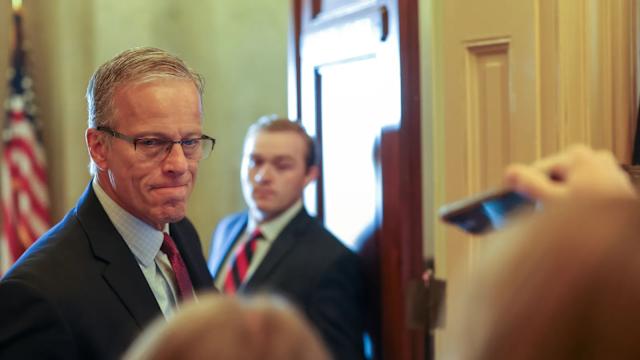Senate passes Trump’s spending bill with massive Medicaid cuts

This story was originally published on Healthcare Dive. To receive daily news and insights, subscribe to our free daily Healthcare Dive newsletter.
The Senate narrowly passed a massive tax and domestic policy bill on Tuesday that would likely cull millions of beneficiaries from the safety-net insurance program Medicaid.
The passage of the legislation — a major priority of President Donald Trump — is a success for Republicans, who’ve dodged a number of policy and political hurdles to get the bill to the finish line.
However, it was a battle to get passed. The Senate slogged through a “vote-a-rama,” where Democrats introduced a number of amendments urging lawmakers to reconsider the Medicaid cuts or boost support to rural hospitals, that began Monday and went through Tuesday midday.
The bill ultimately passed 51-50, after three Republicans, Sens. Rand Paul of Kentucky, Thom Tillis from North Carolina and Susan Collins from Maine, joined Democrats to vote against the package. Vice President JD Vance cast the tiebreaking vote. A similar uphill battle may lie ahead when the bill returns to the House.
The legislation includes several healthcare plans. Many of them center on Medicaid and have become some of the most hotly debated provisions.
Notably, it would require many adult beneficiaries in the safety-net insurance to log a minimum of 80 hours of work, volunteer or education hours a month to stay covered. States would also be required to check beneficiaries’ eligibility for Medicaid more frequently and implement cost-sharing for some services delivered to higher-income enrollees.
Additionally, the bill would freeze provider taxes — arrangements states use to finance their share of Medicaid funding — in states that haven’t expanded Medicaid, and gradually lower allowed rates in expansion states. This is a more aggressive policy than that proposed in the House and was a sticking point for some senators late into Monday evening, who worried rural hospitals in their district would be unable to survive the financial ramifications.
In an effort to woo those on the fence, lawmakers added a $25 billion fund to aid rural hospitals to the package. Late Monday night, Collins proposed doubling that amount to no avail.
"I am pleased that the bill contains a special fund that I proposed to provide some assistance to our rural hospitals, but it is not sufficient to offset the other changes in the Medicaid system," Collins said on X after the vote.
In total, the reconciliation legislation would increase the number of uninsured people by 11.8 million people in 2034, according to an estimate released Saturday by the Congressional Budget Office. It would also increase the nation’s budget deficit by $3.3 trillion over the next decade.
Story ContinuesThe Senate’s bill cuts Medicaid more steeply than the lower chamber’s proposal — $100 billion more due to restrictions on provider taxes and state-directed payments that allow states to boost funding for Medicaid providers, according to an analysis by Manatt Health. Some House Republicans have raised concerns about the Senate’s text, arguing cuts to Medicaid are too steep.
The legislation additionally cuts Medicaid funding for a year for large abortion providers, restricts how Medicaid funds can be used to treat legal migrants and caps how much federal money states can receive if they use their own funds to provide healthcare for undocumented people.
The Senate also made changes to Medicare, including barring most immigrants from receiving services and removing a provision that would tie physician reimbursement rates to a measure of inflation.
The bill faced plenty of challenges in the upper chamber too. GOP senators worked through the weekend in an effort to get the reconciliation legislation to Trump’s desk by July 4, reworking parts of their proposal to appease the Senate parliamentarian and convince lawmakers skeptical about the deep cuts to Medicaid.
Democrat lawmakers staunchly oppose the bill, arguing it preserves tax cuts that benefit the wealthiest Americans while reducing funds for Medicaid and food assistance.
“It’s the biggest Medicaid cut in history and represents the largest transfer of wealth in history,” Sen. Ron Wyden, D-Ore., said on the Senate floor Monday. “It is caviar over kids, hedge funds over healthcare, Mar-a-Lago over the middle class.”
The healthcare sector has been outspoken about the possible impacts of the legislation. Hospitals argue the Medicaid cuts will increase their burden of uncompensated care as the number of uninsured rise, hitting their bottom lines and forcing them to cut services.
“We are deeply disappointed by today’s vote in the United States Senate,” said American Hospital Association CEO Rick Pollack in a statement Tuesday. “The real-life consequences of these nearly $1 trillion in Medicaid cuts – the largest ever proposed by Congress – will result in irreparable harm to our health care system, reducing access to care for all Americans and severely undermining the ability of hospitals and health systems to care for our most vulnerable patients.”
The CEO warned hospitals could see longer wait times and may have to cut staff or close entirely, especially in rural areas.
Now, the bill will return to the House to gain approval. The Senate’s version is likely to face challenges from some conservative members who believe the bill has not gone far enough to cut costs.
“The Senate’s version adds $651 billion to the deficit — and that’s before interest costs, which nearly double the total,” the caucus said in a statement Monday, “That’s not fiscal responsibility. It’s not what we agreed to.”
Recommended Reading
-
Senate Republicans propose deeper Medicaid cuts in reconciliation bill













